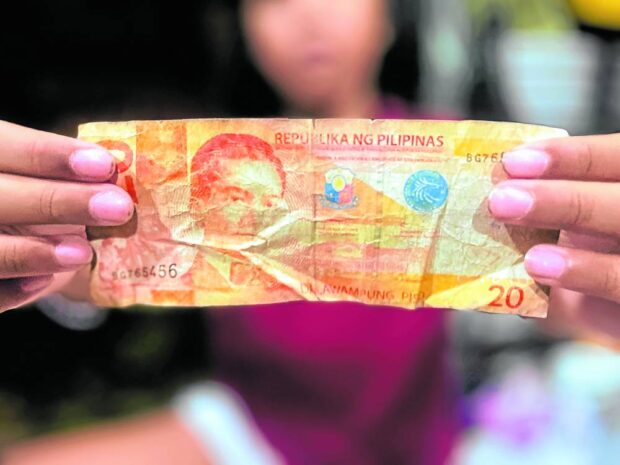BSP seeks out ‘unfit’ peso bills, coins

OLD BILL | Old, crumpled and dirty P20 bills must be surrendered to the central bank for replacement. (File photo by REM ZAMORA / Philippine Daily Inquirer)
MANILA, Philippines — The Bangko Sentral ng Pilipinas (BSP) is ramping up its campaign to replace “unfit” peso bills and coins in circulation, encouraged by the success of its drive in the Visayas which amassed P4 million worth of these notes and coins from January to October this year.
The BSP describes unfit banknotes as bills bearing deep creases, showing signs of disintegration, soiled or stained, marked with extensive writing or markings, and limpness.
A coin is considered unfit for circulation when it is bent, twisted out of shape, defaced, showing signs of corrosion, or considerably reduced in weight.
More importantly, notes and coins are unfit if mutilated—for example, if these have adhesive and staple wires; are ripped or with tears, holes or missing parts; gnawed or chewed by animals; or charred or decayed.
The BSP said residents of the cities of Cebu, Mandaue, Tagbilaran, Dumaguete, Iloilo, Bacolod, Tacloban and Roxas, as well as in the municipalities of Consolacion, Dalaguete, Oslob, Siquijor and Kalibo turned in a total of 38,917 pieces of unfit banknotes—worth about P2.79 million—of mostly 20-peso bills.
Article continues after this advertisementAt the same time, through a total of 24 “Piso Caravan” sorties across these towns and cities, the BSP replaced 683,153 pieces of unfit coins—worth about P1.72 million—of mostly one-peso coins.
Article continues after this advertisementConsidering the turnout and in line with the central bank’s Clean Note and Coin Policy, the BSP intends to roll out more caravans in the Visayas.
Beyond the Visayas, the BSP has also scheduled for today a Piso Caravan in Balanga City in Bataan. Earlier this month, caravans were also held in Baguio City and Alaminos City in Pangasinan.
Recycling program
In a related campaign, the BSP has recirculated a total of P212.9 million in fit coins collected through 25 coin deposit machines (CoDMs) spread out across Metro Manila and nearby areas as of Nov. 15.
Jann Ryan Jose, BSP deputy director, said the deployment of the CoDMs was conceptualized as early as 2021.
“A case was made for a cash recycler program because we had about 36 billion coins in circulation then, but there seemed to be an artificial shortage in some areas in the Philippines,” Jose said.
According to the BSP, as of April 2023, 39.1 billion coins were circulating in the Philippines. This means that, on average, each Filipino has around 358 coins.
This figure is almost three times the 2005 average of 121 coins per individual. When coins are not recirculated and left idle, an artificial coin shortage can happen in certain regions.
In turn, this increases the likelihood of businesses shortchanging their customers—the act of giving insufficient or no change to a consumer who purchased a product or service—which is a violation of Republic Act No. 10909 or the No Shortchanging Act of 2016.
Earlier, in October, BSP Deputy Governor Bernadette Romulo-Puyat said the central bank was looking at getting more CoDMs as the initial batch of 25 units has been popular and effective.
The machines received a total of 42.4 million coins valued at P114.9 million in less than four months—from its launching on June 20 to Oct. 6.
CoDMs are located in most malls of SM and Robinsons in Metro Manila and nearby provinces and in Festival Mall in Muntinlupa City.
The BSP reminded users of the machines to ensure that coins for deposit must not be taped or bundled; must not include foreign objects such as buttons, magnets, nails, tokens, and screws; and should be placed in the machine’s coin slot by the handful.